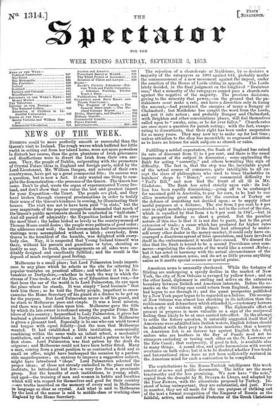Fulfilling a settled expectation, the Bank of England has raised
its rate of discount from 31 to 4 per cent, and there is the usual improvement of the subject in discussion ; some applauding the Bank for acting "correctly," and others bewailing this sign of difficulty. The fact is, that the step was the inevitable sequel of the actual course of commerce, quite intelligible to all ex- cept the class of philosophers who used to trace bluebottles in butchers' shops to "Boney," every commercial difficulty to "Peel's Bill," and now find the fount of all ill in Mr. Gladstone. The Bank has acted strictly upon rule : its bul- lion has been rapidly diminishing,—going off to be exchanged for uncoined gold in Australia, to pay for corn, to be lent to our allies mustering great armies for the coercion of Turkey or the defence of something not decided upon ; or to supply other useful purposes at a distance. The rise from 2 per cent to 4 per cent in eight months is unprecedented ; not in the extent of the rise, which is equalled by that from 4 to 8 per cent in 1847,—but in the proportion during so short a period. But the peculiar nature of this rise is that it is not duo to panic, but to the great extension of trade ; a cause which has produced far higher rates of discount in New York. If the Bank had attempted to under- sell every other dealer in the money-market, it could only have en- couraged a disastrous spread of false speculation, and have involved itself in the embarrassment it would have caused. We discard the idea that the Bank is bound to be a second Providence over com- merce—regulating the elements of the world like a second Aolus ; but it has acted in harmony with the actual circumstances of the day, and with common sense, and its act as little proves anything amiss as it merits special censure or special praise.


























